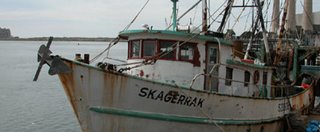
Eating well is a joy that elevates and sustains us. When we appreciate and invest in the sources of our food, we connect the circle and build ourselves.
The Monterey Bay Aquarium shows the world that sustainable seafood works for everyone. No matter who you are, you can eat seafood without contributing to ocean decline, and we’ll all profit from the investment in fishing done right.
Last night’s “
Cooking for Solutions” Gala at the Monterey Bay Aquarium was a high point for me in the pursuit of sustainable seafood. The experience bordered on overwhelming. Wandering through the aquarium, communing with the life of the sea and sampling sustainable offerings from top chefs, it was easy to picture a world of seafood done right. A world where fish are abundant and what we take goes unnoticed. A world where fishing success means a healthy ocean. And especially, a world where investing in the future of the ocean is so richly rewarding. Sustainability has never tasted so good. Thanks to the Monterey Bay Aquarium for creating a better world for a night.
It’s hard to promote sustainability if it means giving up what you want the most. For a seafood lover, the Aquarium’s Gala proves that there’s reward, not sacrifice, for eating in balance with the ocean. And that’s an attractive vision of sustainability.
The Aquarium’s sustainability work goes well beyond the Gala. So far this year, more than 10 million people have received the
Aquarium’s well-loved Seafood Watch cards, packed with advice on how to promote sustainability when you buy seafood. And now, through working with
Bon Appetit and other major seafood buyers, the Aquarium is helping transform the larger seafood marketplace by rewarding sustainability. Another featured guest was the head of Wal-mart’s seafood division, who’s busy proving that sustainability need not cost a fortune. The Aquarium’s vision works, and it’s proving that sustainability is a mainstream value.
It’s true that a few favorite seafood items didn’t show up on the menu, but I’ll be looking for them next year, or in perhaps two or ten years. And when they do show up at the Aquarium, they’ll be like good friends welcomed back to the party. So long as there’s a party to be had without them, I can wait.












 Fishermen paid to stop destructive bottom trawling off California
Fishermen paid to stop destructive bottom trawling off California
